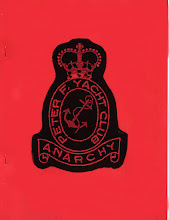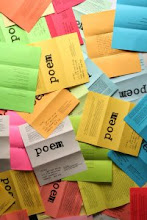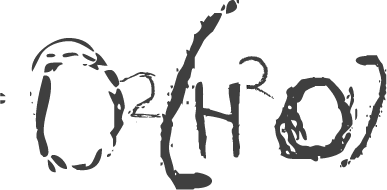Scott
Bryson was good enough to review Marcus McCann’s Labradoodle: A Essay on David McGimpsey (2013), Wanda O’Connor’s damascene road passaggio, selections (2013),
Carrie Olivia Adams’ An Overture in the Key of F (2013) and Gary Barwin’s Seedpod, Microfiche (2013) (copies of all of which are still very much available) in Broken Pencil #62. Thanks, Scott! This is actually the second review of Adams' book (by Joseph LeBine), as well as the second for McCann's title and Barwin's title (by Ryan Pratt). Who knew our books would be garnering so much attention?
This is an enormous amount of generous attention he
has paid to some worthy publications, and we thank him for it. Although I’m not
entirely sure why most of his qualitative judgements upon the works he chose to
discuss are based upon how well he was able to comprehend the poems; as though
figuring out the poem in a particular way (ie -- solving the puzzle of a poem) is more important than attempting to
approach each work on its own terms. Is comprehension, at least in the way
Bryson suggests, the first and foremost goal of reading poems? It reminds me of a response
Gertrude Stein gave to an interview, suggesting that if the reader enjoyed the
piece, then that is, by itself, understanding or “getting it.”
Labradoodle: A Essay on David McGimpsey
Marcus McCannLabradoodle’s subtitle, An Essay on David McGimpsey, may be accurate from a certain perspective, but it’s a tad misleading from most angles. This is certainly more of a poetry collection than an essay – Marcus McCann calls these “chubby sonnets” – and it’s more in the style of comedic writer David McGimpsey, than “on” David McGimpsey (save one biographical poem).Anyone familiar with McGimpsey’s poetry, or his “Self-Esteem Workout” column in Matrix Magazine, will know his jokes are typically a smokescreen for discussions on insecurities and tragic flaws. It’s a distinction that McCann suggests readers tend to miss: “People say, / Oh, David McGimpsey, he’s the guy who writes / funny poems. Which is a little like saying, / Hey, he’s the guy with the really funny cancer” (from “A primer on David McGimpsey for those who have never heard of David McGimpsey”).McCann’s collection straddles the same border between levity and tragedy. He finds a one-word note to himself on his Blackberry, for example, that reads “Cocktapus, and spends the greater part of a poem (“Three years ago, I was not quite ready to use the word labradoodle in a poem”) struggling to remember what it means, invoking Transformers and coming to terms with his immaturity. “Every day is a David McGimpsey poem,” he concludes, “and it’s half golden lab, and half whatever / ‘doodle’ stands for. It is not good news.”Labradoodle is a quick read – there’s little in the way of subtext – but its bemused attitude justifies multiple reads.damascene road passaggio, selections
Wanda O’ConnorNot many chapbooks require an explanatory essay (“subtext/pretext,” the author calls it), but the one Wanda O’Connor includes as an afterword to damascene road passaggio is definitely warranted, even if it’s somewhat obtuse.In her afterword, O’Connor describes this fragmented long poem as “a sequence of asides and sides that take as their companions letters addressed to no one… This project takes up Kafka’s intercourse with ghosts” (an “intercourse” Kafka once likened writing letters to). One would assume there’s also something opera-related happening here – passaggio is a term used to describe pitch ranges in classical singing. Another handy definition: a damascene road – better known as a road to Damascus experience – is a religious conversion, or a revelation about one’s self.A reasonable amount of research is clearly recommended before tackling this chapbook, though the above falls short of providing anything near complete comprehension. O’Connor’s writing isn’t necessarily highbrow – most of these words, lines and stanzas are completely graspable. What’s challenging is attempting to decipher how the fragments of this poem are all related, if they even are. O’Connor does call this “asides and sides,” so it’s probably best to read these verses without an expectation of interconnectedness.The text in damascene road passaggio echoes that fragmentation. Words and stanzas are scattered to the left, right and centre, and handwritten notes mingle with phrases, full sentences and typed correspondence. In spite of this fractured presentation, O’Connor’s verse is surprisingly fluid, which suggests that full understanding will come, eventually (after more research). Let it be said, at least, that this is poetry that teaches.
An Overture in the Key of F
Carrie Olivia AdamsIt’s amusing how blind we can be to the obvious. I was nearly all the way through this Carrie Olivia Adams collection (it’s best described as a lyric essay in parts) before I realized the significance of its title: every paragraph contains a word – often several – that starts with the letter F, and there isn’t a great deal of duplication.This device is a double-edged sword. The alliteration makes for a pleasurable read, but Adams quickly runs out of commonplace F words and resorts to atypical terms like “fungible” (having a dictionary handy while reading this is recommended). As a consequence of this forced use of F words, An Overture in the Key of F tends to provide impressions more than concrete details. Many of Adams’ lines are lists of items that suggest something unmentioned, or that operate as intricate metaphors: “Payment, ransom, bunting, linnet, find… A finger wave, utterly and finally. The scandal of pine.” There’s also definitely an atmosphere of remembering and forgetting present – of trying to put your finger on something fleeting: “The pernicious sound of something familiar, a grief in the breath-filled fading consonant of a lost name.”The air of mystery surrounding this text will be enticing for some – who doesn’t keep returning to a mystery, searching for answers? – but it runs the risk of alienating others. Whether you like or dislike An Overture in the Key of F will likely depend on how easily and quickly you give up. If there’s a detective in you, you’ll keep coming back.Seedpod, Microfiche
Gary BarwinChapbooks with gimmicks can be a risky enterprise, but Gary Barwin is no stranger to themed works. His Franzlations (2011), for example, was a collection built on Franz Kafka-isms.The six selections in Seedpod, Microfiche could either be viewed as the poetic version of a word ladder puzzle (the type of brain-teaser that asks you to change one word into another, in a certain number of steps, by altering a letter at a time) or a written game of Broken Telephone. Barwin is changing more than one letter at a time in these poems – he adds, removes and rearranges several words from poem to poem – but the effect is similar: the opening poem (titled “1”) is transformed, bit by bit over six pages, into a wholly different verse, while retaining a glimmer of its original meaning.This could be considered a safe approach to writing poetry, but it also provides some desirable security for the reader. There’s an extra level of satisfaction to be garnered from a set of poems that are intimately connected, and Seedpod, Microfiche delivers that gratification.The connectedness of these poems is of course assured by their shared foundation, but it’s also enhanced by the repetition of particularly imagery: the power of dew drops to magnify, fish swimming silently, and a stethoscope (used literally and metaphorically) that pops up in the closing stanza of each poem. The titular Microfiche appears repeatedly, as well, and the sentiments it generates are apt: zooming in; many from one; shining a light on part of a whole.

![tenth anniversary Touch the Donkey [a small poetry journal] sale! until the end of April!](https://blogger.googleusercontent.com/img/a/AVvXsEi2jYOBBVNaoMuhOj-BprMchSuruXvCZH2PPniZkk9D30GVF_lQsZ-m9HqsyE4Vz_R01ijgBaze59MbSu3oKIdu4myONflgnuvoMuEdo4qPC7xf0-wB8eukbB6zK5ClasCL-N-iFKZDET3ZL6Ryt4ou8vlwmQEpOEj9Ng4Dcfuv2qybNKlVnRRfpuXrYtGG=s220)















No comments:
Post a Comment